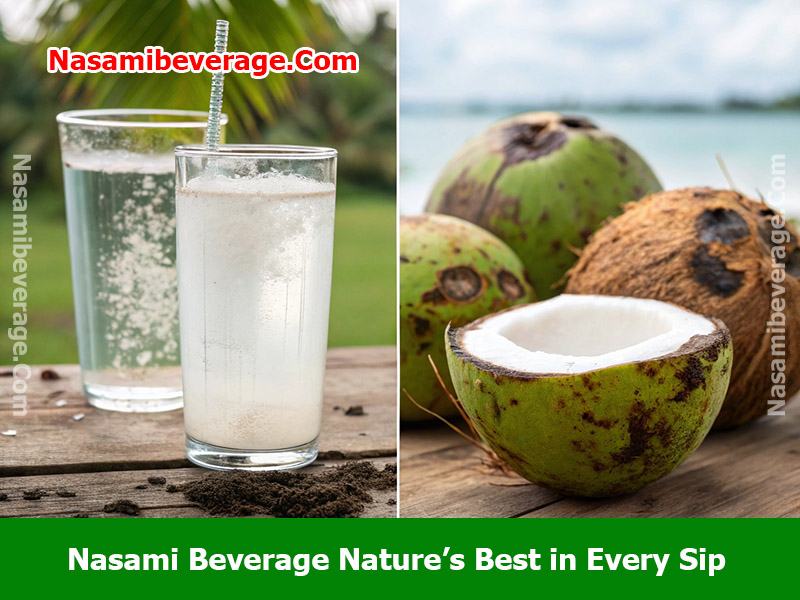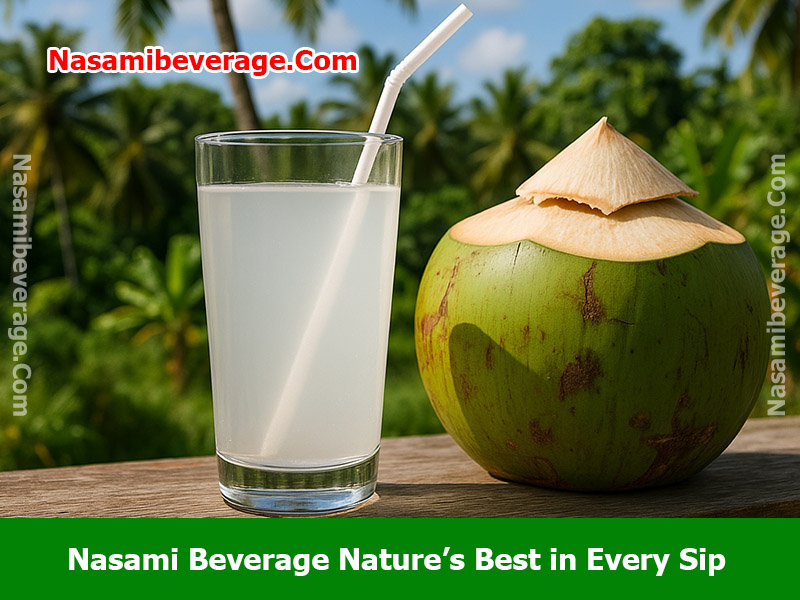Once a tropical delicacy enjoyed straight from the source, coconut water has become a global wellness phenomenon. You see it everywhere, from yoga studios to grocery store aisles. But beyond the hype, what is coconut water exactly? If you have ever wondered what sets this clear, refreshing liquid apart, you have come to the right place. This guide will explore everything you need to know about nature’s sports drink, from its powerful nutritional profile to its science-backed health benefits and how to choose the best bottle for you.
What is coconut water?
Often perceived as a simple tropical beverage, coconut water is, in fact, a fascinating and increasingly popular natural drink with a unique profile.
It is the translucent liquid harvested from the center of young, green coconuts. It’s crucial to distinguish this from coconut milk, which is a processed product created by grating the flesh of a mature coconut and combining it with water.
The result is a much thicker, creamier, and more calorie-dense liquid used primarily in cooking. In contrast, coconut water is lauded for its refreshingly subtle, slightly sweet, and nutty taste profile.
Furthermore, it is naturally low in both sugar and calories, making it a favorable choice for those seeking a light and healthy beverage option.
Electrolyte Content and Hydration
One of the most celebrated attributes of coconut water is its impressive electrolyte composition. It is naturally rich in key electrolytes such as potassium, sodium, and magnesium.
These minerals are vital for numerous bodily functions, and they are particularly important for replenishing the nutrients lost through sweat during physical activity or during periods of mild illness.
This is why coconut water has gained a reputation as a beneficial post-exercise drink. While it certainly aids in rehydration, it’s important to note that for prolonged or intense exercise, it may not be superior to plain water or a scientifically formulated sports drink, primarily because its sodium content is lower than what is often required for optimal recovery after significant sweat loss.
Nevertheless, for general hydration and replenishment of key nutrients, it stands as an excellent natural alternative.
Potential Skincare Benefits
Emerging research has begun to explore the potential benefits of applying coconut water directly to the skin. Although the evidence is not yet definitive, some recent studies suggest that its properties may be beneficial in the fight against acne.
This potential is linked to its antimicrobial and anti-inflammatory properties, as well as the presence of cytokinins, which are plant hormones that may have anti-aging effects on the skin.
While it is unlikely to be a standalone cure for acne, incorporating coconut water into a broader skincare regimen could potentially contribute to healthier-looking skin. More research is needed to fully understand and validate these preliminary findings.
What are the benefits of drinking coconut water?
Incorporating coconut water into your lifestyle can be a refreshing component of a healthy diet, primarily because it excels at helping you stay hydrated while being remarkably low in calories and completely free of fats and cholesterol.
This popular tropical beverage offers more than just a sweet taste. However, before you make it your go-to drink, it’s crucial to be fully aware of its potential effects, particularly for individuals managing conditions like high blood pressure or preparing for surgery.
1/ Aids in Hydration
When compared to many commercial sports drinks, which are often laden with significant amounts of added sugars and artificial flavorings, coconut water stands out as a more natural, low-calorie, and low-carbohydrate alternative for hydration.
Its appeal largely comes from its rich content of electrolytes-specifically potassium, sodium, and magnesium-which are essential minerals for maintaining fluid balance, nerve function, and muscle control. “Because of the electrolytes, some studies indicate that it can help with hydration specifically related to exercise,” notes dietitian Maxine Smith, RD, LD. This makes it a seemingly perfect post-workout beverage.
However, Smith offers an important clarification. The studies demonstrating significant hydration benefits often used coconut water that was specifically enriched with sodium to better replicate the composition of sweat. For the average person enjoying a casual drink, this extra sodium isn’t necessary and may not be ideal.
This type of fortified coconut water should likely be reserved for athletes or individuals engaged in intense physical activity lasting for an hour or more. “It can be helpful during long exercise sessions,” Smith says. “However, the electrolyte profiles can vary between different brands of coconut water.
A scientifically formulated sports drink is a more reliable bet for these demanding situations.” As a general guideline for rehydration after exercise, for every pound of body weight you lose, you should aim to drink about 20 ounces of fluid. While coconut water is an option, “Water is still the best way to hydrate” for most daily needs.
2/ High in Potassium
One of the most significant nutritional highlights of coconut water is its high potassium content. The majority of people do not consume enough potassium in their daily diets, a mineral that plays a vital role in bodily functions. Its primary function in this context is to help counterbalance sodium levels.
By promoting the excretion of excess sodium through your urine, potassium can contribute to healthier blood pressure levels. In fact, preliminary research suggests that regular consumption of coconut water may help lower blood pressure in individuals diagnosed with hypertension.
This same property, however, calls for caution. If you are already taking blood pressure medication, adding potassium-rich coconut water to your diet could potentially lower your blood pressure too much, a condition known as hypotension. It is essential to discuss this with your doctor before making it a regular habit.
Furthermore, due to its potent effect on blood pressure and electrolytes, it is generally recommended to avoid drinking coconut water for at least two weeks before any scheduled surgery to prevent potential complications during the procedure.
3/ Low in Calories
For those who enjoy sweet beverages but are conscious of their calorie intake, coconut water presents an excellent alternative to other fruit juices. Beverages like orange, apple, or grape juice can be dense with natural and sometimes added sugars, leading to a higher calorie count.
Coconut water, in its natural, unsweetened form, offers a lighter option. “It has about 40 to 60 calories in an 8-ounce serving – about half that of orange juice,” Smith explains. This significant difference allows you to enjoy a flavorful drink without derailing your dietary goals. “If you enjoy the taste,” Smith adds, “it can be part of a healthy diet.”
4/ Free of Fat and Cholesterol
Pure coconut water is composed of approximately 94% water, making it inherently fat-free and cholesterol-free. This makes it a heart-healthy choice, especially for individuals monitoring their fat intake for cardiovascular health.
When selecting a product from the shelf, “for recreational drinking, you want to get one that is unsweetened and one that doesn’t have added sodium,” Smith advises. It’s also wise to check the expiration date. As coconut water ages, its nutritional value can diminish, and it may develop an unpleasant, off-taste.
5/ Kidney Stone Prevention
According to the National Institute of Diabetes and Digestive and Kidney Diseases, kidney stones are a prevalent health issue, affecting 11% of men and 6% of women in the U.S. at some point. The cornerstone of prevention is maintaining adequate hydration to keep urine diluted.
Smith suggests that drinking coconut water, as a component of a well-rounded diet, can provide some relief and help flush your system effectively. Its benefits may go beyond simple hydration; a 2018 study revealed that coconut water increased the urinary excretion of potassium, chloride, and citrate.
Citrate is a known inhibitor of kidney stone formation. “There are many different types of stones,” Smith cautions. “But if your physician recommends you get more potassium into your diet, coconut water could be beneficial.”
6/ Healthier Skin
The benefits of coconut water might even extend to your skin’s health. A preliminary 2017 study suggests that coconut water’s natural antimicrobial properties may help in the fight against acne-causing bacteria. Beyond this, research also indicates that consuming coconut water can support your body’s antioxidant system.
It helps neutralize the damaging effects of free radicals-unstable molecules that cause oxidative stress, which contributes to cellular aging and inflammation. By providing a source of antioxidants, coconut water may help protect your skin from within, although more extensive human studies are needed to confirm these effects.
Tips for drinking coconut water
Coconut water has become an incredibly popular beverage, widely available in most grocery stores. While it’s often touted as a healthy, natural drink, there are several important considerations to keep in mind to ensure you’re getting the most out of it safely. Before you grab a carton, here are some detailed tips for choosing and consuming coconut water.
Read the label carefully
The beverage aisle offers numerous brands of coconut water, but not all are created equal. For the best experience, you should look for products that are 100% pure coconut water. Many brands add sugars or sweeteners to enhance the taste, which can introduce unnecessary calories and counteract some of the drink’s natural benefits.
Also, check for preservatives or artificial flavors. Opting for a pure, unadulterated version ensures you’re consuming the beverage in its most natural state, which is rich in various nutrients. While there are many health benefits of coconut water, they are most pronounced when the product is free from additives.
Drink after exercise to boost hydration
After a workout, your body needs to replenish fluids and electrolytes lost through sweat. Coconut water is an excellent natural option for rehydration because it is rich in electrolytes like potassium, sodium, and magnesium. This makes it a great alternative to traditional sports drinks, which are often high in refined sugars and artificial colors.
Enjoy it any time of day
One of the great things about coconut water is its versatility. Because it is light and generally easy to digest, it can be enjoyed on an empty stomach first thing in the morning for a refreshing start, or it can be paired with any meal. It’s a hydrating choice that won’t leave you feeling overly full.
Mix it with other drinks
If the unique, slightly sweet, and nutty taste of plain coconut water isn’t to your liking, don’t give up on it just yet. Try incorporating it into other beverages to make it more palatable. For example, adding a splash to sparkling water creates a light, bubbly, and refreshing drink. You can also use it as the liquid base for your fruit smoothies, which will mask the taste while still providing all the hydrating nutrients.
Use caution if you have certain medical conditions
It is crucial to be mindful of coconut water’s high potassium content. Individuals with chronic kidney disease must carefully manage their potassium intake because their kidneys cannot effectively filter excess amounts from the blood.
Similarly, people taking certain medications like ACE inhibitors (often prescribed for high blood pressure) should also be cautious, as these drugs can cause potassium retention. In these cases, consuming high-potassium foods and drinks like coconut water could lead to dangerously high levels in the body, a condition known as hyperkalemia. Always consult with a doctor if you have these conditions.
Avoid it if you are pregnant
While coconut water is natural, there is currently insufficient scientific research to definitively conclude how it might affect pregnant individuals and their developing babies. Due to this lack of data, medical professionals like Smith advise taking a cautious approach. To ensure the utmost safety during pregnancy, it is best to avoid coconut water and stick to beverages that have been proven safe.
Frequently asked questions about coconut water
What is the difference between coconut water and coconut milk?
Coconut water is the clear, hydrating liquid from young, green coconuts. Coconut milk is a creamy, processed product made from the flesh of mature brown coconuts, containing much more fat and calories.
Is coconut water better than water for hydration?
For everyday hydration, plain water is perfect. However, for light to moderate exercise or when you need to replenish electrolytes quickly, coconut water’s combination of water and minerals like potassium can be more beneficial.
Can I drink coconut water every day?
Yes, for most people, drinking coconut water daily is safe and healthy when done in moderation. Its low-calorie and high-potassium profile makes it a great addition to a balanced diet. However, those with kidney disease or high potassium levels should consult a doctor first.
What should I look for when buying coconut water?
Always check the ingredients list. The best choice is 100% coconut water with no added sugar, preservatives, or artificial flavors.
Where does coconut water come from?
It comes directly from the center of young, green coconuts. Countries in tropical regions, such as Thailand, Brazil, the Philippines, and Indonesia, are the primary sources of coconuts for commercial water production.
Coconut water is far more than a passing trend. It is a naturally delicious, nutrient-dense beverage that offers serious hydration and health benefits. Whether you drink it to recover after a workout, to support your heart health, or simply as a refreshing treat, you are enjoying one of nature’s finest gifts.
By choosing a pure, unsweetened product, you can feel great about what you are putting into your body. This comprehensive guide was compiled by the team at Nasami Beverage to help you make informed and healthy choices.



